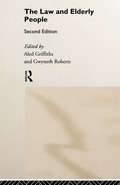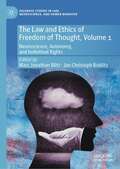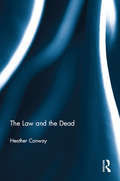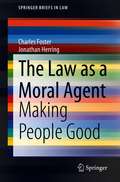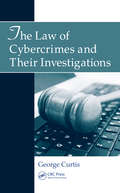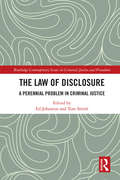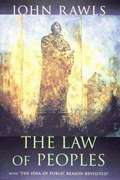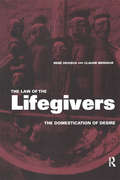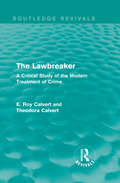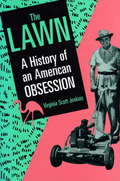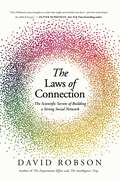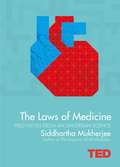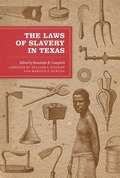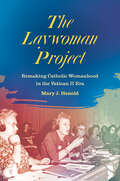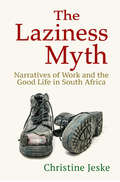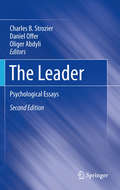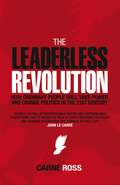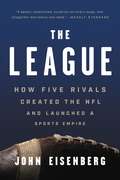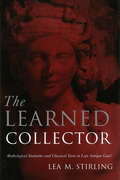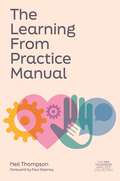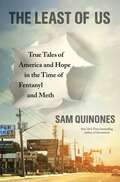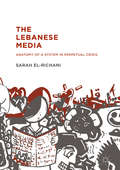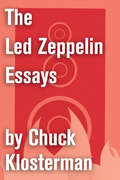- Table View
- List View
The Law and Elderly People
by Aled Griffiths Dr Gwyneth Roberts Gwyneth RobertsAlthough the number of elderly people in Britain is increasing steadily, the law in relation to their particular needs is a relatively neglected field. The Law and Elderly People was the first text to provide easily accessible information for those involved in advice-giving and service provision in this rapidly developing field. This second edition has been fully revised and completely updated to reflect the major legal and social changes which have recently occurred. Concerned for the independence and autonomy of both young elderly and the old elderly, the book covers employment and income, accomodation and housing, community and residential care, health provision and delivery and family relationships, thus providing an important guide to the most important legal issues. The Law and Elderly People will be of practical help to all those concerned with the welfare of the elderly and to undergraduates and lecturers in social work, law and gerontology.
The Law and Ethics of Freedom of Thought, Volume 1: Neuroscience, Autonomy, and Individual Rights (Palgrave Studies in Law, Neuroscience, and Human Behavior)
by Marc Jonathan Blitz Jan Christoph BublitzFreedom of thought is one of the great and venerable notions of Western thought, often celebrated in philosophical texts – and described as a crucial right in American, European, and International Law, and in that of other jurisdictions. What it means more precisely is, however, anything but clear; surprisingly little writing has been devoted to it. In the past, perhaps, there has been little need for such elaboration. As one Supreme Court Justice stressed, “[f]reedom to think is absolute of its own nature” because even “the most tyrannical government is powerless to control the inward workings of the mind.” But the rise of brain scanning, cognition enhancement, and other emerging technologies make this question a more pressing one. This volume provides an interdisciplinary exploration of how freedom of thought might function as an ethical principle and as a constitutional or human right. It draws on philosophy, legal analysis, history, and reflections on neuroscience and neurotechnology to explore what respect for freedom of thought (or an individual’s cognitive liberty or autonomy) requires.
The Law and The Lawyers
by M. K. GandhiGandhiji practised as a lawyer for over twenty years before he gave up the practice of the profession in order to devote all his time and energy to public service. The valuable experience and skill that he acquired in the course of his large and lucrative practice stood him in good stead in fighting his battles with the South African and British governments for securing political, economic and social justice for his fellow-countrymen. Year by year, the enlightened opinion of the world enshrines Gandhi in a noble place in the hearts of mankind. The life and example of the Mahatma who ennobled the legal profession, who remained faithful to its highest traditions, and who showed the heights to which it can be raised ought to form part of the teaching and training of every law student. This book will have more than served its purpose if it inspires the reader, be he a lawyer or a layman, with the belief that the vocation of the lawyer is an honourable vocation requiring the highest standards of rectitude, integrity and uprightness, and that its practice is in no way inconsistent with the pursuit of truth. [From the Introduction] Sunit B. Kher
The Law and the Dead
by Heather ConwayThe fate of the dead is a compelling and emotive subject, which also raises increasingly complex legal questions. This book focuses on the substantive laws around disposal of the recently deceased and associated issues around their post-mortem fate. It looks primarily at the laws in England and Wales but also offers a comparative approach, drawing heavily on material from other common law jurisdictions including Australia, New Zealand, Canada and the United States. The book provides an in-depth, contextual and comparative analysis of the substantive laws and policy issues around corpse disposal, exhumation and the posthumous treatment of the dead, including commemoration. Topics covered include: the legal frameworks around burial, cremation and other disposal methods; the hierarchy of persons who have a legal duty to dispose of the dead and who are entitled to possession of the deceased’s remains; offences against the dead; family burial disputes, and the legal status of burial instructions; the posthumous use of donated bodily material; and the rules around disinterment, and creating an appropriate memorial. A key theme of the book will be to look at the manner in which conflicts involving the dead are becoming increasingly common in secular, multi-cultural societies where the traditional nuclear family model is no longer the norm, and how such legal contests are resolved by courts. As the first comprehensive survey of the laws in this area for decades, this book will be of use to academics, lawyers and judges adjudicating on issues around the fate of the dead, as well as the death industry and funeral service providers.
The Law as a Moral Agent: Making People Good (SpringerBriefs in Law)
by Charles Foster Jonathan HerringThis book examines the controversial and repercussive contention that an objective of the law should be to promote personal morality - to make people ethically better. It surveys a number of domains, including criminal law, tort law, contract law, family law, and medical law (particularly the realm of moral enhancement technologies) asking for each: (a) Does the existing law seek to promote personal morality? (b) If so, what is the account of morality promoted, and what is the substantive content? (c) Does it work? and (d) Is this a legitimate objective?
The Law of Cybercrimes and Their Investigations
by George CurtisCybercrime has become increasingly prevalent in the new millennium as computer-savvy criminals have developed more sophisticated ways to victimize people online and through other digital means. The Law of Cybercrimes and Their Investigations is a comprehensive text exploring the gamut of issues surrounding this growing phenomenon.After an introduct
The Law of Disclosure: A Perennial Problem in Criminal Justice (Routledge Contemporary Issues in Criminal Justice and Procedure)
by Ed Johnston; Tom SmithThis edited collection explores the topic of disclosure of evidence and information in the criminal justice process. The book critically analyses the major issues driving the long-standing problem of dysfunctional disclosure practice, with contributions from academics, lawyers, former police officers, and current police policymakers. The ultimate objective is to review the key problems at the investigative, trial and post-conviction stages of criminal proceedings, and to suggest a way forward through potential routes of reform, both legal and cultural. The collection represents a significant and novel contribution to the policy debate regarding disclosure, and advances thought on resolving this issue in a fair and sustainable manner. The book provides a valuable resource for academics, practitioners and policymakers working on this vital aspect of criminal procedure.
The Law of Peoples
by John RawlsThis work consists of two parts: the essay The Idea of Public Reason Revisited, first published in 1997, and The Law of Peoples, a major reworking of a much shorter article by the same name published in 1993. Taken together, they are the culmination of more than 50 years of reflection on liberalism and on some of the most pressing problems of our times by John Rawls.
The Law of Refugee Status
by James C. Hathaway Michelle FosterThe first edition of The Law of Refugee Status (published in 1991) is generally regarded as the seminal text on interpreting the refugee definition set by the UN's 1951 Refugee Convention. Its groundbreaking analysis served as the bedrock for not only much judicial reasoning, but also for a burgeoning academic literature in law and related fields. This second edition builds on the strong critical focus and human rights orientation of the first edition, but undertakes an entirely original analysis of the jurisprudence of leading common law and select civil law states. The authors provide robust responses to the most difficult questions of refugee status in a clear and direct way. The result is a comprehensive and truly global analysis of the central question in asylum law: who is a refugee?
The Law of the Lifegivers: The Domestication of Desire
by Claude Brodeur René DevischAfrican societies are gifted with a rich creativity, often expressed in intimate corporeal terms. For the Yaka people of southwestern Congo, such manifestations can have individual, social, or even cosmic significance. The Law of the Lifegivers investigates the importance among the Yaka of body and space in their daily life, exercise of power, and initiatic traditions. Through this analysis, Devisch and Brodeur show that body, desire, and symbol are intertwined, so that bodily expression can act as sensuous and powerful symbol. The domestication of passion and the institutionalizing of a subject are all expressed in bodily terms, particularly during initiations; the ethical order of law rests on many bodily symbols, including the importance of maternal and paternal lifegivers. The authors vividly describe the different life-giving or life-threatening roles which function in this society, such as sorcerer, diviner, therapist, and chief, as well as the funeral drama which shapes the passage to the afterlife with the ancestors, as experienced by the dying subject and his community. Through their dialogue and correspondence, Devisch and Brodeur (an anthropologist and a psychoanalyst, respectively) bring together two, sometimes conflicting, intellectual approaches. They aim to unravel a truth which is freed, as much as possible, from the presumption that only the West possesses the knowledge of objective discourse and science. Through the interaction, the authors reveal the semantic threads, located at the very heart of the most vital, life-giving processes, which weave the fabric of the practice and thought of a riveting, passionate Africa.
The Lawbreaker: A Critical Study of the Modern Treatment of Crime (Routledge Revivals)
by E. Roy Calvert Theodora CalvertThe early 21st century saw better prison conditions and a lower imprisonment rate however public worry over supposed increasing violent crime as perpetuated by the media in the 1930’s led to a return to harsher sentences and fuller prisons. Originally published in 1933, The Lawbreaker analyses British penal methods of the time and of the past to discover the most effective ways to treat prisoners and reduce crime as well as identifying where more research is needed to obtain a balance between punishment and rehabilitation. This title will be of interest to students of Criminology and Sociology.
The Lawn
by Virginia JenkinsLawns now blanket thirty million acres of the United States, but until the late nineteenth century few Americans had any desire for a front lawn, much less access to seeds for growing one. In her comprehensive history of this uniquely American obsession, Virginia Scott Jenkins traces the origin of the front lawn aesthetic, the development of the lawn-care industry, its environmental impact, and modern as well as historic alternatives to lawn mania.
The Laws of Connection: The Scientific Secrets of Building a Strong Social Network
by David RobsonThis groundbreaking study reveals how social connections are far more important than we thought, showing us the steps we can take to build better relationships and improve our lives.Social connection is as essential for our health and happiness as a balanced diet and regular exercise. It reduces our risk of stroke, heart disease, and Alzheimer&’s. It enhances our creativity and adds years to our life span. Yet many of us struggle to form strong and meaningful bonds—and the problem lies not with our personalities but with a series of cognitive biases that stop us from fulfilling our social potential. In The Laws of Connection, award-winning science writer David Robson describes the psychological barriers that lead us to keep others at a distance and offers evidence-based strategies to overcome them. Drawing on philosophy, neuroscience, and cutting-edge psychology, Robson introduces readers to new concepts such as the liking gap, the novelty penalty, the fast-friendship procedure, the beautiful mess effect, and the Japanese art of amae. Whether we are shy or confident, introvert or extrovert, we can all build deeper relationships. The Laws of Connection shows us how.
The Laws of Medicine
by Siddhartha MukherjeeThe Laws of Medicine follows Pulitzer-Prize-winning author, Dr Mukherjee as he investigates some of the most perplexing and illuminating cases of his career - the cases that ultimately led him to identify the three key principles that govern medicine. As a young medical student, Mukherjee discovered The Youngest Science, a book that changed the way he understood the medical profession and forced him to ask himself an urgent, fundamental question: Is medicine a 'science'? Science must have laws - statements of truth based on repeated experiments that describe some universal attribute of nature. Dr Mukherjee has spent his career pondering whether the 'youngest science' has laws like the other sciences, culminating in this treatise The Laws of Medicine. Law 1: Rumours are more important than tests. Law 2: The piece of data that does not fit your model is the most crucial piece of data that you own. Law 3: For every perfect medical experiment, there is a perfect human bias. Brimming with fascinating historical details and modern medical wonders, this book is a glimpse into the struggles and Eureka! moments rarely seen by those outside the profession.
The Laws of Slavery in Texas
by Randolph B. CampbellThe laws that governed the institution of slavery in early Texas were enacted over a fifty-year period in which Texas moved through incarnations as a Spanish colony, a Mexican state, an independent republic, a part of the United States, and a Confederate state. This unusual legal heritage sets Texas apart from the other slave-holding states and provides a unique opportunity to examine how slave laws were enacted and upheld as political and legal structures changed. The Laws of Slavery in Texas makes that examination possible by combining seminal historical essays with excerpts from key legal documents from the slave period and tying them together with interpretive commentary by the foremost scholar on the subject, Randolph B. Campbell. Campbell's commentary focuses on an aspect of slave law that was particularly evident in the evolving legal system of early Texas: the dilemma that arose when human beings were treated as property. As Campbell points out, defining slaves as moveable property, or chattel, presented a serious difficulty to those who wrote and interpreted the law because, unlike any other form of property, slaves were sentient beings. They were held responsible for their crimes, and in numerous other ways statute and case law dealing with slavery recognized the humanness of the enslaved. Attempts to protect the property rights of slave owners led to increasingly restrictive laws--including laws concerning free blacks--that were difficult to uphold. The documents in this collection reveal both the roots of the dilemma and its inevitable outcome.
The Laywoman Project: Remaking Catholic Womanhood in the Vatican II Era
by Mary J. HenoldSummoning everyday Catholic laywomen to the forefront of twentieth-century Catholic history, Mary J. Henold considers how these committed parishioners experienced their religion in the wake of Vatican II (1962–1965). This era saw major changes within the heavily patriarchal religious faith—at the same time as an American feminist revolution caught fire. Who was the Catholic woman for a new era? Henold uncovers a vast archive of writing, both intimate and public facing, by hundreds of rank-and-file American laywomen active in national laywomen's groups, including the National Council of Catholic Women, the Catholic Daughters of America, and the Daughters of Isabella. These records evoke a formative period when laywomen played publicly with a surprising variety of ideas about their own position in the Catholic Church.While marginalized near the bottom of the church hierarchy, laywomen quietly but purposefully engaged both their religious and gender roles as changing circumstances called them into question. Some eventually chose feminism while others rejected it, but most, Henold says, crafted a middle position: even conservative, nonfeminist laywomen came to reject the idea that the church could adapt to the modern world while keeping women's status frozen in amber.
The Laziness Myth: Narratives of Work and the Good Life in South Africa
by Christine JeskeWhen people cannot find good work, can they still find good lives? By investigating this question in the context of South Africa, where only 43 percent of adults are employed, Christine Jeske invites readers to examine their own assumptions about how work and the good life do or do not coincide. The Laziness Myth challenges the widespread premise that hard work determines success by tracing the titular "laziness myth," a persistent narrative that disguises the systems and structures that produce inequalities while blaming unemployment and other social ills on the so-called laziness of particular class, racial, and ethnic groups. Jeske offers evidence of the laziness myth's harsh consequences, as well as insights into how to challenge it with other South African narratives of a good life. In contexts as diverse as rapping in a library, manufacturing leather shoes, weed-whacking neighbors' yards, negotiating marriage plans, and sharing water taps, the people described in this book will stimulate discussion on creative possibilities for seeking the good life in and out of employment, in South Africa and elsewhere.
The Leader
by Charles B. Strozier Daniel Offer Oliger AbdyliThis volume examines the lives of prominent leaders from ancient Greece to the present. It explores how these leaders imposed their individual missions and mystiques on others, thereby fulfilling , and sometimes creating, distinct needs in their followers.
The Leaderless Revolution: How Ordinary People Will Take Power and Change Politics in the 21st Century
by Carne RossThere are few books that attempt to interpret the world and how it is run. The Leaderless Revolution offers a refreshing and potent contrast to the Panglossian optimism of Tom Friedman's The World is Flat but, like that book, it offers a way of understanding the world of the 21st century that is both clear and easily comprehensible. Carne Ross takes different angles on contemporary issues - economics, politics, the state of democracy, the environment and terrorism - wrapping them into a unified explanation of how money and power function to control the lives of the earth's inhabitants, such that they feel powerless to affect their collective future. It seems that mankind has settled upon liberal democracy as the ideal form of government. Its triumph with the collapse of communism signalled the end of ideological struggle and thus of history. The Leaderless Revolution will show however that even in democracies, many if not most of the population feel that they are excluded from any agency over the issues that most trouble them, while governments appear less and less able to influence the global problems that threaten our peace and comforts. Mining the rich but little-examined histories of both cosmopolitanism and anarchism, The Leaderless Revolution shows how both ideas, in combination, are relevant and necessary for the problems of today. Not only an antidote to our global crises; Carne Ross offers, moreover, a route to fulfillment and self-realisation.
The League: How Five Rivals Created the NFL and Launched a Sports Empire
by John EisenbergThe epic tale of the five owners who shepherded the NFL through its tumultuous early decades and built the most popular sport in America The National Football League is a towering, distinctly American colossus spewing out $13 billion in annual revenue. Yet its current dominance has obscured how professional football got its start. In The League, John Eisenberg reveals that Art Rooney, George Halas, Tim Mara, George Preston Marshall, and Bert Bell took an immense risk by investing in the professional game. At that time the sport barely registered on the national scene, where college football, baseball, boxing, and horseracing dominated. The five owners succeeded only because at critical junctures in the 1920s, 1930s, and 1940s each sacrificed the short-term success of his team for the longer-term good of the League. At once a history of a sport and a remarkable story of business ingenuity, The League is an essential read for any fan of our true national pastime.
The Learned Collector: Mythological Statuettes and Classical Taste in Late Antique Gaul
by Lea M. StirlingInspired by a classical education, wealthy Romans populated the glittering interiors of their villas and homes with marble statuettes of ancestors, emperors, gods, and mythological figures. In The Learned Collector, Lea M. Stirling shows how the literary education received by all aristocrats, pagan and Christian alike, was fundamental in shaping their artistic taste while demonstrating how that taste was considered an important marker of status. Surveying collections across the empire, Stirling examines different ways that sculptural collections expressed not only the wealth but the identity of their aristocratic owners. The majority of statues in late antique homes were heirlooms and antiques. Mythological statuary, which would be interpreted in varying degrees of complexity, favored themes reflecting aristocratic pastimes such as dining and hunting. The Learned Collector investigates the manufacture of these distinctive statuettes in the later fourth century, the reasons for their popularity, and their modes of display in Gaul and the empire. Although the destruction of ancient artwork looms large in the common view of late antiquity, statuary of mythological figures continued to be displayed and manufactured into the early fifth century. Stirling surveys the sculptural decor of late antique villas across the empire to reveal the universal and regional trends in the late antique confluence of literary education, mythological references, aristocratic mores, and classicizing taste. Deftly combining art historical, archaeological, and literary evidence, this book will be important to classicists and art historians alike. Stirling's accessible writing style makes this an important work for scholars, students, and anyone with an interest in Roman statues of this era.
The Learning From Practice Manual (The Neil Thompson Practice Collection)
by Neil ThompsonNeil Thompson sets out what you really need to know about supporting further learning during placement and practice. Stripping away the confusion and anxiety about 'what next?', this manual goes back to the core theories of how learning works in the first place, and how you can synchronise that with values and reflective practice to help your students and colleagues reach their professional goals. Summaries illustrate and reinforce the guidance, creating a set of easy-to-follow strategies for effective workplace development mentoring.Accessible explanations guide you through the theory and practice, covering everything from fostering a learning environment to troubleshooting difficulties and encouraging a culture of self-directed learning. Grow your mentoring skills and help your colleagues get to grips with not just what to learn, but how to learn it and make it stick.
The Least of Us: True Tales of America and Hope in the Time of Fentanyl And Meth
by Sam QuinonesFrom the New York Times bestselling author of DREAMLAND, a searing follow-up that explores the terrifying next stages of the opioid epidemic and the quiet yet ardent stories of community repair. Sam Quinones traveled from Mexico to main streets across the United States to create Dreamland, a groundbreaking portrait of the opioid epidemic that awakened the nation. As we struggled to put back the pieces, Quinones was among the first to see the dangers that lay ahead: synthetic drugs and a new generation of kingpins whose product could be made in Magic Bullet blenders. In fentanyl, traffickers landed a painkiller a hundred times more powerful than morphine. They laced it into cocaine, meth, and counterfeit pills to cause tens of thousands of deaths--at the same time as Mexican traffickers made methamphetamine cheaper and more potent than ever, creating, Sam argues, swaths of mental illness and a surge in homelessness across the United States. Quinones hit the road to investigate these new threats, discovering how addiction is exacerbated by consumer-product corporations. "In a time when drug traffickers act like corporations and corporations like traffickers," he writes, "our best defense, perhaps our only defense, lies in bolstering community." Amid a landscape of despair, Quinones found hope in those embracing the forgotten and ignored, illuminating the striking truth that we are only as strong as our most vulnerable. Weaving analysis of the drug trade into stories of humble communities, The Least of Us delivers an unexpected and awe-inspiring response to the call that shocked the nation in Sam Quinones's award-winning Dreamland. SAM QUINONES is a journalist, storyteller, former Los Angeles Times reporter, and author of three acclaimed books of narrative nonfiction, including New York Times bestseller and National Book Critics Circle Award winner Dreamland: The True Tale of America's Opiate Epidemic. "The most original writer on Mexico and the border" (San Francisco Chronicle), he lives with his family in Southern California.
The Lebanese Media
by Sarah El-RichaniThis book presents an analysis of the current Lebanese media system. From a theoretical angle, it discusses the extent to which this system can be analyzed using the ideal types put forth by Hallin and Mancini in their seminal work Comparing Media Systems. Sarah El-Richani assesses the complex dimensions developed by the two scholars and utilizes their work as inspiration for a process of remodeling, amending the sub-indicators to identify salient factors and suggesting a new model. Featuring the views of over 60 stakeholders, this book gives a rare, critical, and concise account of the Lebanese media system.
The Led Zeppelin Essays
by Chuck KlostermanOriginally collected in Chuck Klosterman IV and now available both as a stand-alone essay and in the ebook collection Chuck Klosterman on Rock, this essay is about Led Zeppelin.
